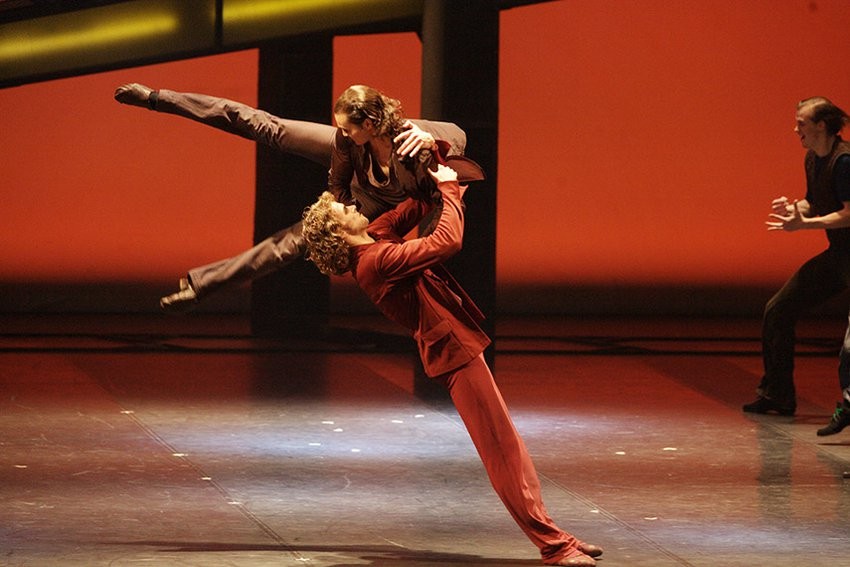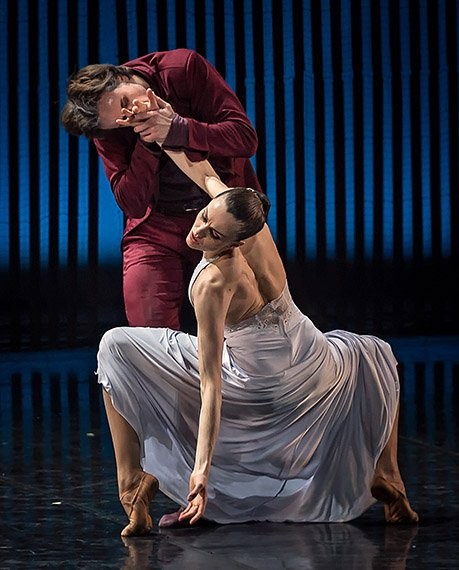Modern Ballet Modern Dance Ballet of Boris Eifman. "Onegin" (ballet in two acts). Music: Pyotr Tchaikovsky, Alexander Sitkovetsky
Modern Dance Ballet of Boris Eifman

Running time: 2 hours
The performance has 1 intermission
Schedule for Modern Dance Ballet of Boris Eifman. "Onegin" (ballet in two acts). Music: Pyotr Tchaikovsky, Alexander Sitkovetsky 2022
Choreography: Boris Eifman
Set Designer: Vyacheslav Okunev
Composer: Ludwig Van Beethoven
Composer: Gustav Mahler
Modern Ballet in 2 act
Premiere of this production: 3 March 2009
Boris Eifman’s name is usually linked to the most innovative artistic experiments and interpretations or stage renditions of classical works of literature. The choreographer constantly revitalizes and enriches the form and content of contemporary ballet.
Eugene Onegin – is a dance version of Eugene Onegin novel in verse by Alexander Pushkin. Here Eifman combines classics and modernity. Pushkin's heroes impersonalize men and women of today in a symbolic way: they are those who have gone through a drastic social change, who are living in the time of crisis, at the turn of the century. An unexpected combination of classical music by Pyotr Tchaikovsky and of rock music by Alexander Sitkovetsky is something that surprisingly helps the viewers get inspired by the original creative concept of Boris Eifman.
Eugene Onegin ballet is a unique opportunity to see the paradigmatic, textbook literary plot through the eyes of the modern man.
Keeping in line with the mission to promote Russian contemporary choreographic art, Eifman Ballet has been actively engaged in touring all over the world. The Company’s touring geography includes, besides Russia, many countries such as Canada, China, Denmark, Finland, France, Germany, Italy, Israel, Netherlands, Poland, Slovenia, Switzerland, South Korea, Spain, USA, and others. Eifman Ballet's current repertoire includes world-acclaimed ballets Anna Karenina (2005), The Seagull (2007), Eugene Onegin (2009), I, Don Quixote (2010), Rodin (2011), Beyond Sin / The Karamazovs (2013), Requiem (2014), Up & Down (2015), Red Giselle (2015). The most recent ballet Tchaikovsky. PRO et CONTRA was premiered in St. Petersburg in May, 2016.
“When I rely on great literature in my ballets, I do it in an attempt to express, by means of choreographic art, the emotional impact and amazement I get from learning the wisdom and creative power of our great predecessors. Word – is an instrument both for creation and destruction, it can crush as easily as breathe new life.
The plastic language of body movement, as the oldest in history way of self expression, carries with it universal values, spiritual and emotional, that anyone can understand. Thus, using a literary source I thereby set myself a specific task: to reveal what may be relevant and exciting for my contemporaries, and with it something that can be conveyed solely by the great art of dance.
Then, the question is: why did I choose Alexander Pushkin’s versified novel Eugene Onegin for my ballet? What is of concern to me in it? Literary critics and scholars have called this book ‘Encyclopedia of Russian Life’. Pushkin, by extraordinarily vivid and scrupulously exact mastery of word coupled with a great talent for psychological insight, depicted the Russian national character of his time, created the poetical image of the Russian soul – mysterious, unpredictable and unparalleled in its sensuousness.
With all my art I have been endeavoring to discover the secrets of the Russian soul. My choreographic treatment of Eugene Onegin is only another attempt at expressing in dance the mystery of human spirit.
What I’ve done in the ballet was to place Pushkin’s characters in the modern times, in new circumstances and conditions that may seem to be more dramatic, sometimes even extreme, when the old world is collapsing and the life powerfully imposes new rules. I needed this sort of experiment in order to answer a question that really concerns me: what is the Russian soul today? Has it retained its singularity, its mystery, its appeal of past times? How the main characters of the novel would order their own destinies today? What in the ‘Encyclopedia of Russian Life’ was only ‘period problems’ and what has remained and shall remain as the sign of destiny for many generations of my compatriots to come?
The art of choreography does not provide us with solutions to the burning issues of the life and development of society. Yet, handling them in a creative way, analyzing them and offering an individual assessment of them, we thereby partake in the process of its improvement and betterment.”
Boris Eifman
Boris Eifman - Artistic Director of St. Petersburg Eifman Ballet
People’s Artist of Russia, the Laureate of the State Prize of the Russian Federation, the laureate of the Golden Mask and the Golden Soffit awards, the holder of the Order of Merit for the Fatherland, 2nd class.
Boris Eifman, the founder and creator of his own theater, his own style, and his own ballet universe, who is called “one of the leading choreographers in the world” and an “amazing magician of the theater”, was born in 1946 in Siberia, into a family that was connected neither with ballet nor the theatre. From early childhood, however, he wanted to express his feelings and his thoughts in body language, in dance. He himself would later say, “For me, ballet is more than a profession. It is a means of existence, my mission on this earth. Using its resources, I am compelled to convey what is given to me from on high. Most likely, I would simply suffocate on my emotions if I didn’t have the possibility of expressing them through art. For me, choreography is art that is deeply religious, in the broadest sense of the word.”
The innate sense of movement and the “instinct to compose” brought him to the Leningrad Conservatory, where he studied in the Choreography Department, and then to the Vaganova Academy of Russian Ballet, where he worked for ten years as a choreographer, composing new works for student performances. Finally, in 1977, he formed his own ballet ensemble. This is the moment when the Eifman story began, as, with his talent, with his blood and sweat, with his energy, dedicating himself a full twenty four hours a day, he began to create his own theatre.
Eifman brilliantly combined cutting-edge achievements in the world of ballet with what he learned in the academic school of classical Russian choreography, to which he traces his roots. “What I do can be called the dance of emotions, free dance, a new language, in which classical ballet, modern dance, ecstatic impulses and many other things are interwoven…,” he said at the time. His dancers, who had an exclusively academic grounding, had to acquire a new vocabulary of body movement. It was a completely different kind of choreography, whose fundamental principle came into being as the troupe was formed by Eifman.
Eifman Ballet was established by Boris Eifman in 1977 (the original name of the company was the Leningrad New Ballet). The concept of the New Ballet was more than innovative for its time: from the first days of its work it was conceived and developed as an experimental laboratory, a ballet theatre for one choreographer.
The company’s first performances such as Two-Voice and Boomerang brought success and stirred intense interest of the audience; ballet critics began arguing about new tendencies in the Russian ballet. Advocates of the traditional ballet school, however, were rather reluctant to acknowledge the young choreographer’s authority. Eifman’s novelty in how he chose literary basis and music for his ballets, the audacity of the body movement vocabulary secured for him the reputation of “a choreographic dissident”.
In late 70s – early 80s Eifman’s theatre is working out its own individual approach to repertoire formation. More and more new ballets based on the world classical literature appear on the playbill. The choreographer and his company, characterised by an outstanding dance intellect, explore new genres. Boris Eifman creates performances whose distinguishing feature is the strikingly sharp choreographic patterns, intended to express the fiery passions of ballets’ characters: The Duel, The Idiot, The Mad March Day, or the Marriage of Figaro, The Legend, The Twelfth Night, Master and Margarita, Murderers etc.
Today St. Petersburg Eifman Ballet is renowned among ballet lovers in Asia, Europe, the Americas and in Australia for such ballets as Tchaikovsky; I, Don Quixote; Red Giselle, Russian Hamlet, Anna Karenina, The Seagull, Onegin, Rodin, Beyond Sin, Requiem and Up & Down. These works were generally recognised. Not only they represent the highest artistic level of achievements of the contemporary Russian ballet, but also turn the audience to the immortal spiritual heritage of Russian and world culture that inspired the choreographer and his dancers.
Boris Eifman’s endeavour to engage his spectators in the infinite world of human passions, to form a spiritual liaison with the audience, to amaze viewers by the brilliance and dynamism of his plastique – all this has ensured a decades-long success of Eifman Ballet’s performances at leading venues around the globe.
Boris Eifman is a philosopher choreographer. He is earnestly concerned with the problems of today, with the secrets of creativity. The choreographer speaks openly with his audience about the complicated and dramatic aspects of human life; he defines his genre as “psychological ballet”. The New York Times calls Boris Eifman the leader among living choreographers: “The ballet world in search of a major choreographer need search no more. He is Boris Eifman.”
The company is distinguished by its brilliant technique, unique dedication and high onstage intelligence. Today excellent dancers, winners of international ballet contests and laureates of the Russian Government prizes in the field of culture, holders of the prestigious Golden Mask and Golden Soffit awards, implement Boris Eifman’s ideas: Oleg Gabyshev, Dmitry Fisher, Nina Zmievets, Lyubov Andreyeva, Anastasia Sitnikova, Sergey Volobuev and others.
An important period in the company’s life began in 2011, when the Government of St. Petersburg took a decision to launch the construction of the Boris Eifman Dance Academy – a project originally initiated by the choreographer himself. In September 2013 the Academy announced the start of its first academic year.
Another Eifman-initiated ballet institution is to be built and opened in St. Petersburg in the near future. It is the Boris Eifman Dance Palace envisioned by Boris Eifman as a new world center of dance arts.
Forming an original ballet repertoire of modern Russia based upon the rich traditions of Russian psychological theatre, along with searching for and developing new forms of choreography of the XXI century are among the key priorities within the artistic mission of Boris Eifman and his brilliant company.





Schedule for Modern Dance Ballet of Boris Eifman. "Onegin" (ballet in two acts). Music: Pyotr Tchaikovsky, Alexander Sitkovetsky 2022
| Eifman Ballet's Onegin excerpts |
|
| |
|
|
|
About This Video 11:42 Eifman Ballet's Onegin excerpts |
     
|



